Search the Special Collections and Archives Portal
Search Results
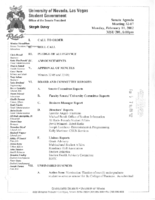
Meeting minutes for Consolidated Student Senate University of Nevada, Las Vegas, February 11, 2002
Date
Archival Collection
Description
Text
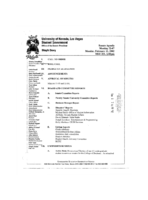
Meeting minutes for Consolidated Student Senate University of Nevada, Las Vegas, February 07, 2002
Date
Archival Collection
Description
Text

Meeting minutes for Consolidated Student Senate, University of Nevada, Las Vegas, February 10, 2003
Date
Archival Collection
Description
Text
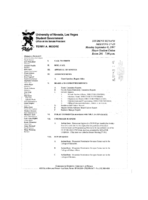
Meeting minutes for Consolidated Student Senate University of Nevada, Las Vegas, September 8, 1997
Date
Archival Collection
Description
Text
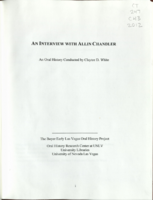
Transcript of interview with Allin Chandler by Claytee White, February 5, 2013
Date
Archival Collection
Description
Another member of Rancho High School's first graduating class of 1962, Allin Chandler charted a course that took him from school football to a distinguished career as a teacher, principal, and Executive Director for the Clark County Association of School Administrators. Allin moved to Las Vegas from Texarkana, Texas with his mother in 1958, joining his father who was serving in the Air Force and stationed at Nellis AFB. Starting 9th grade at J.D. Smith Junior High and continuing on to Rancho the following year. Still actively involved in school athletics, Allin quickly discovered his talent and love for maths and science and eventually earned his degree in math and education. The stories Allin shares in this interview paint a vivid picture of how an intelligent and motivated young man can succeed - and how the class-free world of Las Vegas in the 1950s and 60s offered opportunities that he would never have had in class-conscious world of the South.
Text

Transcript of interview with Myra Berkovits by Barbara Tabach, August 21, 2014
Date
Archival Collection
Description
Interview with Myra Berkovits by Barbara Tabach on August 21, 2014. In this interview, Berkovits talks about growing up and starting her teaching career in Chicago. When she moves to Las Vegas, Berkovits eventually purchases a dining concierge business, but returned to teaching, and is now involved with the Sperling Kronberg Mack Holocaust Resource Center.
Myra Berkovits was born Myra Mosse in 1944 in Chicago, Illinois. She became an elementary school teacher in Chicago before moving to Las Vegas in 1980. Myra has made contributions to Las Vegas in the public and private sectors. She owned several businesses then returned to teaching, heading to the University of Nevada, Las Vegas (UNLV) to renew her teaching license and later received her master's degree. After a year of teaching in multicultural education, Myra was then in charge of the school district's homeless program, seeing its growth from serving 1,200 to 6,000 students. Myra's other passion was for Holocaust education and she became one of six interviewers in the city for the Shoah Foundation, documenting survivors' stories. One interviewee, David Berkovits, would later become her husband of fifteen years. Myra's own Holocaust education was aided by powerful trips to Israel and Poland. She used these experiences to develop and lead student-teacher conferences and classroom curriculum for the whole state. Myra still serves at the Education Specialist at the Holocaust Resource Center.
Text

Transcript of interview with Arne Rosencrantz by Claytee White, February 9, 2010
Date
Archival Collection
Description
In this interview, focused on the John S. Park neighborhood of Las Vegas, Arne Rosencrantz discusses his childhood growing up in Las Vegas. He talks about local businesses, including his father's furniture store, as well as schools and churches in the neighborhood.
Arne Rosencrantz remembers living on Beverly Way from 1954 to 1970. Like so many others from that era, he attended Fifth Street School, John S. Park Elementary School, John C. Fremont Middle School and graduated from Las Vegas High School. As a Jew, he was in a small minority, but fondly recalls growing up in the dense Mormon population of John S. Park Neighborhood. As a youngster, life in Las Vegas was filled with fun. The desert provided opportunity to hunt lizards and rabbits. Kids walked to school without concern. They played ball and found the Strip casinos welcoming to locals. He tells how the social issue of segregation of the 1960s did not affect him personally, but how local movie theatre owner Lloyd Katz fought to make his Huntridge and Fremont theatres integrated. He also reminisces about his father opening Hollywood Furniture and later Garrett's Furniture, which Arne operated until retiring in 2001. During the interview, he lists other furniture companies and the strong assortment of other retailers and restaurants that served the neighborhood.
Text
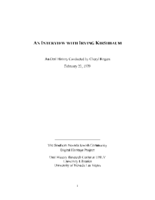
Transcript of interview with Irving Kirshbaum by Cheryl Rogers, February 23, 1979
Date
Archival Collection
Description
Interview with Irving Kirshbaum by Cheryl Rogers on February 23, 1979. In this interview, Kirshbaum discusses the Riviera Hotel where he began working in 1955. He also talks about the landscape of the Las Vegas Strip in the 1950s, and the state of gambling, comps, customer service, and dealer training. The interviewer asks about the treatment of minorities at the Riviera, and in Las Vegas generally, and the effect of corporate ownership on casinos.
Text

Transcript of roundtable interview with the Holocaust Resource Center: Myra Berkovits, Susan Dubin and Doug Unger, by Barbara Tabach, September 4, 2014
Date
Archival Collection
Description
Interview with Myra Berkovits, Susan Dubin and Doug Unger of the Holocaust Resource Center. In this interview, the group discusses the beginnings of what is now the Sperling Kronberg Mack Holocaust Resource Center. Edythe Katz-Yarchever is discussed as the catalyst for establishing the center and getting others involved with the Governor's Advisory Council on Education Relating to the Holocaust. Berkovits talks about her role as a liason for Holocaust education in the Clark County School District and the student-teacher conferences held each year with funding from Sheldon Adelson. Unger discusses expanding the outreach to the Washoe County School District with assistance from Atlantis Hotel (Reno, Nev.) owner, John Farahi and Judy Mack. They talk about the previous locations of the Holocaust Resource Center on Maryland Parkway, then Renaissance Drive, and the affiliation with the Jewish Federation and the Jewish Family Service Agency. After funding and personnel issues around 2011, the advisory council and the library went through a re-structuring and hired Susan Dubin who organized and catalogued the library collection. The library is now accredited by the Association of Jewish Libraries.
Text

Transcript of interview with Henry Kronberg by Barbara Tabach, February 26, 2015 and April 13, 2015
Date
Archival Collection
Description
Interview with Henry Kronberg by Barbara Tabach in two sessions, February 26 and April 13, 2015. In the first session Kronberg talks about his childhood in Germany and Poland and his experience being imprisoned by the Gestapo, and transported to a concentration camp. He survived the Holocaust and met his wife, and they moved to the United States in 1946. He discusses being reunited with his sister in Las Vegas after decades of searching, and moved his family to Las Vegas in 1962. Kronberg talks about becoming involved with Jewish life here, and his wife, Lillian's involvement at Temple Beth Sholom. In the second session, Kronberg discusses purchasing Stoney's, a loan and pawn shop, including some of the clientele and merchandise. He also discusses other social and environmental concerns like anti-Semitism and water resources in Southern Nevada.
Henry Kronberg was born in 1920 and spent his early childhood in a town on the border of Poland and Germany, about 40 miles from Krakow. For years he felt uncomfortable telling his story of surviving the Nazi concentration camps of World War II. Today his name is linked to the Sperling Kronberg Mack Holocaust Resource Center in Las Vegas. And in his soft-spoken manner, Henry recalls his ordeal of loss of family and survival during this most heinous of situations through backbreaking labor and ingenuity. At the end of the war, Henry met the love of his life, Lillian, also a survivor. The two married in 1946 in Frankfurt and immigrated to New Jersey where she had relatives. He describes their difficulties and the various jobs he held until becoming an excellent baker. Then in 1962 an interesting choice took him to a bar mitzvah in Canada. While there the dinner conversation lead him to a great discovery?his sister Lala had survived and was living in Las Vegas. Soon he moved his wife and daughter to Las Vegas. His first foray into business was with his brother-in-law. However, soon it was important to be independent and to control his own destiny. He purchased a going concern, Stoney's Pawn Shop, from Dr. Alexander Coblentz, one of the city's first doctors. He became the fourth owner of Stoney's and operated it until selling it to Steven Mack in 1998. Henry and his wife were active in the Jewish community. They joined Temple Beth Sholom and became fast friends with many of the early leaders of Las Vegas and became a respected member of the secular and Jewish communities.
Text
